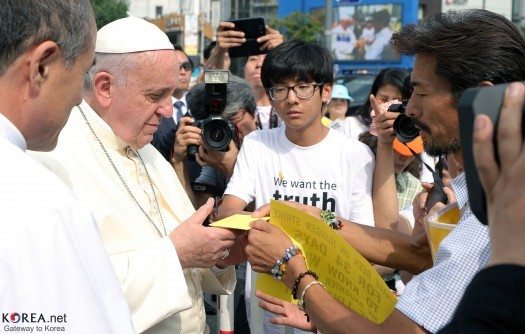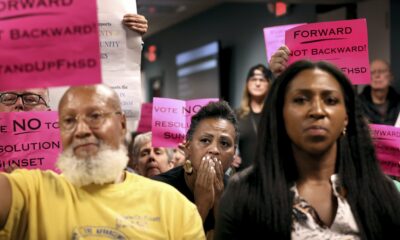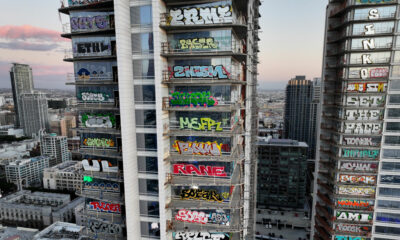Society
The Listener: Pope Francis Sets a Different Course

He’s been a pope of many firsts already. The first to invite Catholics to forgive women who have had abortions, and the first to refrain from judging gay people to cite just two that have made headlines. But he’s also arguably the first pope to press hard against not just the reality of poverty, but the culpability of the economic system that is in large part driving it. He’s vocal about immigration. It’s as if Pope Francis is the first pope who is actually listening, and that makes him relevant in a way his predecessors simply were not.
He’s also about to be the first pope to ever speak before Congress. We can only hope they’ll listen. Since nearly a third of them are Catholics, I think many of them will. In fact, there are more Catholics in Washington these days than ever. Six of the 9 Supreme Court Justices are Catholics, including Anthony Kennedy, who provided the swing vote that legalized gay marriage across the land. And there are a slew of Catholics running for President, from Jeb Bush and Bobby Jindal to Chris Christie, Marco Rubio and Martin O’Malley – and even Joe Biden, if you want to count outliers.
I think they will listen and they will respond, because they live and die by polls, and over the weekend, a New York Times poll found the pope’s approval ratings rising through the roof among American Catholics, with a full 9 out of 10 supporting his offering an olive branch to those who’ve had abortions. What’s more, he enjoys a 70% approval among Americans in general.
In the hothouse of American politics, Christianity – Catholic or otherwise – tends to remain pretty much in the mode of John Paul II and/or Southern Baptist, which is to say ‘my way or the highway.’ Christianity is seen as the domain of Republicans, and yet there is a huge silent majority of Christian Democrats, and my guess is they’re more likely to be actually practicing the faith than those who grab the headlines. They’ll be listening to Pope Francis because they feel he’s listening to them.
Pope Francis is a Jesuit, and that’s my theory on why he has engaged people. Jesuits stress being engaged – which is what Liberation Theology in Central and South America is and was about. Engagement is about challenging the status quo, and you gotta hand it to the Jesuits that they’ve been more or less thrown out of Latin America twice for doing just that – challenging the powers that be.
There is a strain of intellect and social savvy among Jesuits that is noteworthy. My uncle Tom McCormack S.J. comes to mind, a popular teacher at Loyola High School here in Los Angeles, as does Father Greg Boyle, of course, the founder of Homeboy Industries, who speaks eloquently about an inclusive God and theology in his outreach to gang members. Closer to home – when I told my mother I was gay, she was concerned for my eternal soul and went from priest to priest, looking for an O.K. She finally found it – with a Jesuit.
Christianity for a few days will get a chance to show how influential and constructive it can be when practiced with openness, aspiration and understanding – in a word, “listening.”
So what Pope Francis’ visit means to an ex-Catholic like me, and I think to many Christians, is that Christianity for a few days will get a chance to show how influential and constructive it can be when practiced with openness, aspiration and understanding – in a word, “listening.” And I’m hopeful that that kind of encouragement will set in motion a dialog in our society that doesn’t revolve around religion being the domain of the likes of Kim Davis and Mike Huckabee, victims who are arguably disengaged from more pressing issues, not to mention stubbornly anti-intellectual and anti-fact. Irresponsible grandstanding negates the real concerns many Christians have and the constructive solutions many of them espouse. We are worse off when the dialog about the inclusion Fr. Boyle talks about is drowned out by the tiresome exclusion that the Christian right continues to propagate as it hypocritically promotes war, social discord, blatant cruelty and an us vs. them mentality in the name of a ‘loving’ God.
But while many Catholics are impressed with Francis’s openness about such important issues as abortion, LGBT persons, climate change, immigration and economic inequality, they would like to see him more rigorously address the sexual abuse scandals that still hang over the church like a shadow. After all, he has little power over the big economic and environmental issues he likes to talk about, but a great deal of power over cleaning house at the Vatican and investigating and bringing to justice every criminal priest.
Yet, just as it follows that being socially savvy means being media-savvy, Pope Francis is not going to spend a lot of time talking about something that will eclipse everything else on the table, and place the church in a bad light (canonizing Junipero Serra, a case in point). This pope, unlike his predecessors, knows how to play the media to his and the church’s advantage, and he will not do otherwise. Who can say who leaks the stories, but when it was learned he was going for midnight walks to comfort Rome’s homeless, it was as if the papacy had suddenly entered the 21st century. Not since Pope John XXIII could critics of the church actually entertain the possibility that a pope was a contemporary and not some anachronistic throwback to a time of rule by fiat. I mean, did it really take until 2015 for a pope to ask to forego the papal palace and live instead in a small apartment? Jerry Brown did that in 1976 when he slept on a futon in a small apartment near California’s Capitol. Which isn’t to say American politicians are somehow holier than the pope, although Governor Brown is certainly a step above his peers. Well, he is Jesuit-trained, no wonder.
My question is this: Is Pope Francis just another pope, this time with a better PR touch, or is he a real agent of change? Perhaps he is only a messenger. But even if that’s so, such a message amplified via the power of the media he has engaged has already set a course that is irreversible. If the best of Christianity is highlighted in that course, that is a good outcome for the Pope, his Church, Christians in general – and in the end, all of us.
-

 Latest NewsApril 8, 2024
Latest NewsApril 8, 2024Report: Banks Should Set Stricter Climate Goals for Agriculture Clients
-

 Latest NewsApril 22, 2024
Latest NewsApril 22, 2024Oil Companies Must Set Aside More Money to Plug Wells, a New Rule Says. But It Won’t Be Enough.
-

 Striking BackMarch 25, 2024
Striking BackMarch 25, 2024Unionizing Planned Parenthood
-

 California UncoveredApril 9, 2024
California UncoveredApril 9, 2024700,000 Undocumented Californians Recently Became Eligible for Medi-Cal. Many May Be Afraid to Sign Up.
-

 Feet to the FireApril 22, 2024
Feet to the FireApril 22, 2024Regional U.S. Banks Sharply Expand Lending to Oil and Gas Projects
-

 Class WarMarch 26, 2024
Class WarMarch 26, 2024‘They Don’t Want to Teach Black History’
-

 Latest NewsApril 10, 2024
Latest NewsApril 10, 2024The Transatlantic Battle to Stop Methane Gas Exports From South Texas
-

 Latest NewsMarch 27, 2024
Latest NewsMarch 27, 2024Street Artists Say Graffiti on Abandoned L.A. High-Rises Is Disruptive, Divisive Art




















